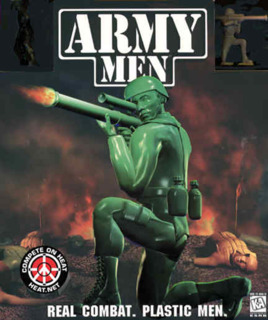The poor little naive version of this reviewer at the time had mistaken this game for a Toy Story spin-off, and being the little child that was infatuated with Toy Story, had unwittingly played this game hoping for the same joy-ride that was Disney's movie.
However, the disintegrating toy soldiers, explosions, flying plastic limbs and surprisingly intimidating toy tanks quickly changed this reviewer's perception of games involving the little green and tan men.
As this reviewer's first impression has already suggested, this game was quite the looker for its generation. The titular little plastic men in particular are quite impressive to look at, especially (sadistically enough) their death animations. Gunfire does look a bit dated, however, but watching tank shells and rocket fire streaking towards their targets were very satisfying - more so if they connect. However, the game does seem to forget that it is throwing plastic war toys into the fray often, resulting in interesting and puzzling graphical oddities, such as having wrecked vehicles emit out-of-place but very satisfying smoldering oil fires.
Sound-wise, the game is mostly filled with the usual sounds of war: gunfire, explosions and the screams of dying men. If not for the fact that plastic toy soldiers are involved, the game could have been easily re-categorized beyond the reach of minors (this reviewer included, at the time).
In-game, the player primarily guides the protagonist, known simply as Sarge (a particularly tougher and faster than usual plastic soldier of the Green Army faction), around in campaign-only missions. For a game categorized as an action game, it is rather initially odd that the game provides a bird's-eye-view of a camera that is more common in RTS games instead, but this does turn out to be beneficial for maintaining situational awareness.
As a veteran soldier, Sarge has a repertoire of choices that he can select to complete whatever task is at hand. Most of his capabilities involve the picking up and swapping around of equipment, all of which can be used optimally in certain situations and locations within the map. Sarge also has a limited number of support abilities that he can call upon, such as air-strikes and reinforcements of friendly troops that he can order around. Add to these the presence of allied units that are already on the map, and one can see that the player is given many, many ways to tackle a mission with (whose briefings are written out clearly for the player to read).
This is perhaps the greatest strength of the game; the player has the freedom to handle any obstacles and problems in any mission as they see fit. There are no strict solutions to these. For example, an enemy tank can be gotten rid of via mortar strikes (after spotting it with recon planes), luring it onto minefields, distracting it with friendly troops while calling in an air-strike, flanking it with a bazooka or throwing grenades at it from behind cover.
Unfortunately, the effectiveness of this game design is diminished somewhat by the lack of a game-saving feature. Considering that there can be many hindrances in between objectives in a mission, and many of these tend to be lethal, having the tough-but-still-fragile Sarge slough through them can be a painful endeavor of trial-and-error. It won't take long for persistent players to discover cheap tactics and exploits (of which there are quite a bit) for missions. This understandably detracts from the game's plus-point of giving the player much leeway in completing said missions.
As for the story, it can be said that the game is sometimes too serious for the presence of plastic soldiers, suggesting that the game's early builds might not have intended to have plastic soldiers as the protagonists (& antagonists). It is really no more than an excuse to pit two factions against each other.
The multiplayer experience of this game is sort of akin to tactical squad games; units and abilities available to a player are limited, and has to be husbanded carefully when utilized to diminish the opposition's own. Unfortunately, most matches that this reviewer had participated in tend to boil down to waiting games of attrition, one side waiting for the other to commit. There was no really built-in incentive in the game for players to take the initiative.
In conclusion, Army Men could have been a great game, had the developers had the decency to play-test the game more than they had and realized the need for a game-saving feature to complement the otherwise splendid single-player campaign, as well as more multiplayer options to enrich the rather bland multiplayer portion of the game.

